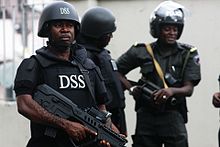
So often, and for reasons that range from ignorance through inexperience, to overzealousness to please a principal, and sheer arrogance of power, Nigeria’s law officers are wont to act beyond their brief, go beyond the call of duty, and misuse their legally conferred powers. These flaws were acted out in Akwa Ibom State the other day when an officer of the Directorate of State Security Service (DSS) threatened to shoot journalists who were going about their professional and legitimate business. He was quoted to boast in a fit of indiscipline that ‘I will shoot all of you right now …call any one you want to call…’ This is outrageous. An operative armed with a gun to boot, but lacking a modicum of self-control is dangerous to life and must have no place within the law enforcement system.
For too long, the actual or threatened misbehaviour by officers of the law especially within the DSS and the Nigeria Police Force occur too often; if they are not beating up the very citizens they are trained and paid to protect, they are carrying out arbitrary and unlawful arrests with the intention to extort. And even in the apparent discharge of lawful protection of their principals, they harass motorists off the road, manhandle decent persons who complain of misbehaviour, and generally carry about as a law unto themselves. Recently, and in a laughably glaring display of arrogance, men of the DSS reportedly prevented an agency of government from discharging its lawful duty.
There is a sort of tyranny of the uniform in the land; too many personnel within the security forces generally act in total disrespect for the security of society. Regrettably, punishments for these infractions are few and far between, which may explain the many incidents. All these are not right at all. They put the perpetrator, the force, and the country in bad light. It is no wonder that recently the Nigeria Police Force, for example, was rightly or wrongly, ranked by one foreign body as the worst in the world. It is the ultimate irresponsibility and a disgrace too, that a public officer and an officer of the law to boot, should act in breach of the law. There can be no doubt that there is need for an urgent overhaul of the entire law enforcement system that will include re-training on the rules that govern security functions as stipulated in the laws, the provisions of the Constitution on fundamental rights, refreshment course in the extant code of conduct, individual psychological assessment, incentives for good conduct and tough sanctions for acts that bring the security services into disrepute.
The 1999 Constitution (as amended) considers the media of public information sufficiently crucial to both the efficiency and the effectiveness of government to provide a guarantee of unfettered performance of its duty. Section 22 states that ‘The press, radio, television, and other mass media shall at all times be free to uphold the fundamental objectives in (chapter II) and uphold the responsivity and accountability of the government to the people.’ In order to function effectively, the press must have access to people in government in order to provide the public with truthful and balanced information. It stands to reason that any public officer who disallows in whatever manner, men of the press from doing their professional duty violates the Constitution and, by extension harms the smooth functioning of the machinery of democratic governance. That is a grave offence. But there is more to that.
The mission of the DSS ‘is to protect and defend the Federal Republic of Nigeria against domestic threats, to uphold and enforce the criminal laws of Nigeria, and to provide leadership and criminal justice services to both federal and state law enforcement organs.’ The directorate also protects high ranking public officials, members of their families, and other persons deemed deserving of such protection. Clearly, a well-bred DSS officer has no business harassing and threatening any citizens going about his or her lawful business the way the officer in the Akwa Ibom Government House did.
In respect of the Nigeria Police Force, its Five-point Mission Statement includes ‘to build a people-friendly police force that will respect and uphold the fundamental rights of all citizens.’ The 7 Values professed includes to ‘deliver quality police service that is accessible to the generality of the people,’ to ‘build a lasting trust in the police by members of the public,’ and to ‘protect and uphold the rights of persons, to be impartial and respectful in the performance of Police duties.’
It bears repeating that the erring DSS officer in Akwa Ibom State must be identified and punished as a way to deter similar acts and also to demonstrate clearly that over-reaction, over-zealousness, and unprofessional conduct generally are against the norm of the directorate.
END

Be the first to comment